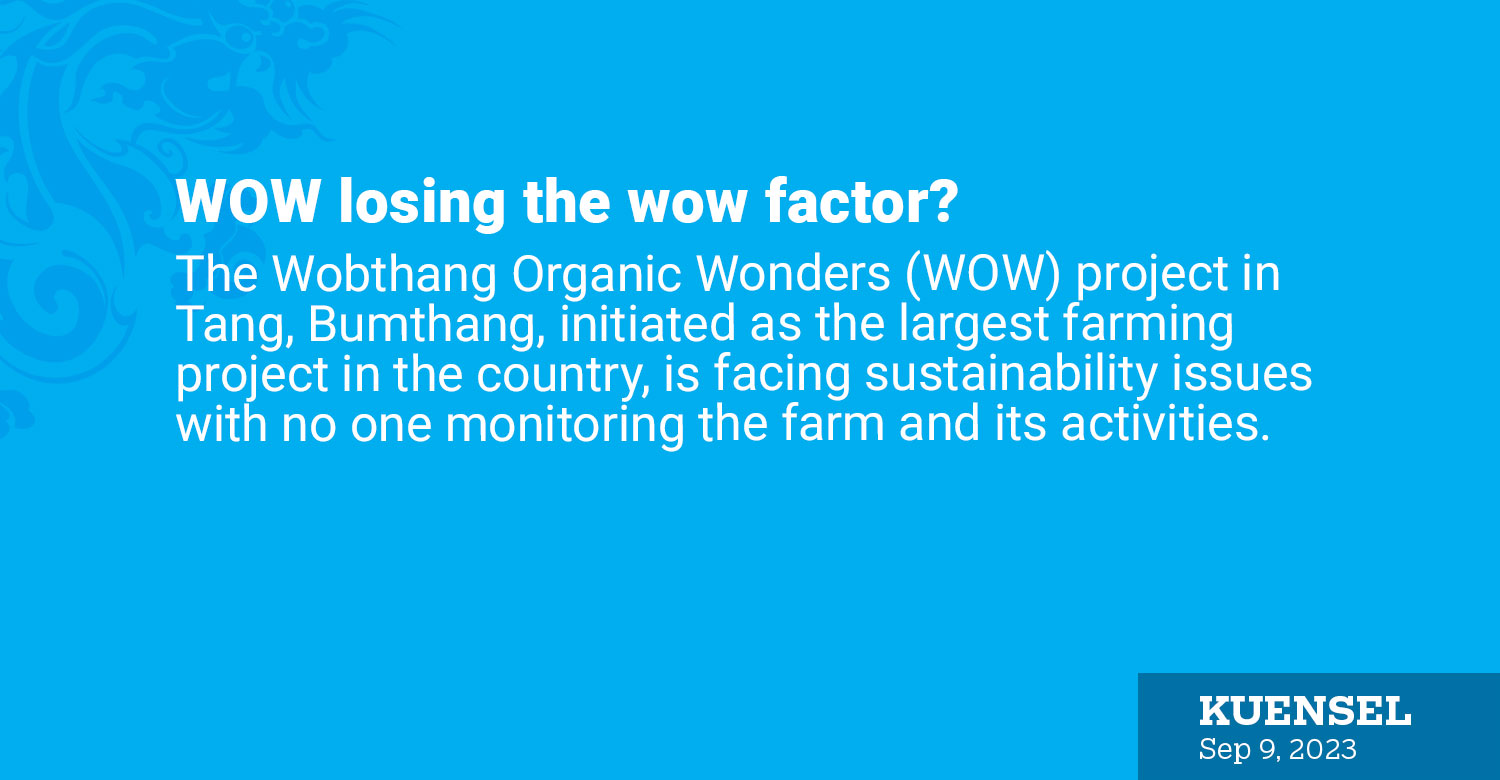
Organic project facing sustainability challenges
Dechen Dolkar
The Wobthang Organic Wonders (WOW) project in Tang, Bumthang, initiated as the largest farming project in the country, is facing sustainability issues with no one monitoring the farm and its activities.
Former Opposition Leader (OL), Pema Gyamtsho (PhD), together with two former agriculture officials initiated and implemented the project during the Covid-19 pandemic in May 2020 to produce vegetables.
Recognising the importance of the project, several agencies under the agriculture and livestock ministry provided support – machinery and technical – during its development phase.
The project, according to the former OL, started with support from the Prime Minister’s Office.
The Prime Minister’s office committed its support in the form of Nu 4 Million (M) pre-financing. Altogether, more than Nu 10M was invested in the project so far. The former OL and his partners contributed Nu 6M to the project with the government fund spent on labour payments and for hiring machinery.
However, as of today the project has lost its WOW factor. Wobthang is not producing vegetables as expected. The failure is attributed to lack of market demand, availability and affordability of farm labour, raiding of crops by wildlife, and inability to integrate with other enterprises.
Kuensel learnt that the project is now facing sustainability issue since there is lack of ownership and that there is no one to monitor it.
The community claims that the project had not benefited them after the huge government investment. Members of the community told Kuensel that there is no one monitoring the project while they are confused about its ownership.
Today, there is not a single employee at the farm. In the initial year of the project, there was a farm manager and a driver.
This year, a member of a community dairy farm cultivated buckwheat on a few acres. The community dairy farm has also cultivated a few vegetables in the greenhouse, but only for self-consumption.
Meanwhile, the former OL, Pema Gyamtsho, who is the Director of ICIMOD, based in Nepal, said that he is monitoring the project remotely. However, he admitted that he could not give much attention this year due to lack of time.
Dr Pema Gyamtsho said that during the initial years, around 50 acres of land were developed including clearing of bushes and scrub, field preparation, electric fencing and improvement of roads and drains with the support of the National Organic Programme, dzongkhag and gewog administrations.
The project also constructed 10 greenhouses with support from the Food and Agriculture Organisation. He said that the project also helped the development of the degraded pastures through clearing, drainage construction and resowing of degraded pastures used by the community dairy farm with the support of the Department of Livestock.
He added that the project employed all youth and farmers from the neighbouring villages, enabling them to earn income during the pandemic and the farm hired local tractors and power tillers for the operations.
In the first year, the farm grew beans, peas, radish, turnips, carrots, buckwheat and mustard. He said that due to the high cost of transportation and a lack of a local market, they were not able to sell their produce. “Instead, we supplied them for free to local monasteries and schools.”
In the second year, the farm cultivated potatoes and they could sell only around 10 metric tons. In the greenhouses, they grew chilli, tomatoes, zucchini and other vegetables, but could not sell due to poor local demand.
In 2022, the farm grew potatoes, but much of the produce was lost to wild boars.
Future plans
The former OL said that the farm envisaged to integrate eco and agro-tourism in collaboration with the local communities. However, this could not materialise as tourist numbers plummeted in the last few years.
However, he said that based on the experience from the past few years, the project has developed a business plan which will take off next year.
“The proposal is to invest in more farm machinery to overcome labour shortage, reinforce electric fencing with wire mesh fencing and repellents, and focus on producing cereals like buckwheat, wheat and rye,” he said.
The project will also engage a trained farm manager to restart the operations, later this year.












